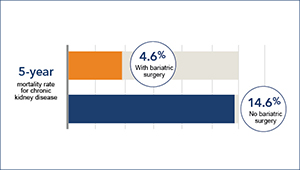Eric A. Johnson, MS
Biography
Eric Johnson, MS, completed the University of Washington’s biostatistics master’s program in 2008. His thesis explored common theoretical problems involved with missing data. He quantified them, highlighting conditions leading to suboptimal performance, and provided new guidelines for using various multiple imputation techniques.
During his time at KPWHRI, Mr. Johnson has been involved with multiple projects involving direct intervention with the care-delivery system, observational studies and microsimulation modeling on colorectal and ovarian cancer, massage therapy, and estimating radiation exposure from medical imaging. His current responsibilities lie in research on obesity, opioids, and mental health.
Before earning his master’s degree, Mr. Johnson worked for four years as a research assistant on the Multi-Ethnic Study of Atherosclerosis (MESA), performing statistical analyses, verifying incoming data, and developing a process for providing data sets to all MESA researchers. Later, he was a research statistician with the Department of Veteran Affairs (VA), serving as the primary analyst in an investigation of how well VA hospitals performed non-cardiac surgeries. Mr. Johnson assessed statistical models used by the National Surgical Quality Improvement Program—then devised, tested, and implemented improved models, reporting his findings to VA leadership.
Research interests and experience
-
Biostatistics
Multiple imputation; prediction models, working with large data
-
Health Systems
Implementing prediction models, and validating that they work as intended. Research into interventions that are financially feasible for health systems to widely implement
-
Cancer
-
Complementary & Integrative Health
-
Health Services & Economics
-
Obesity
-
Mental Health
Recent publications
Hubbard RA, Johnson E, Chubak J, Wernli KJ, Kamineni A, Bogart A, Rutter CM Accounting for misclassification in electronic health records-derived exposures using generalized linear finite mixture models 2017 Jun;17(2):101-112. doi: 10.1007/s10742-016-0149-5. Epub 2016-06-03. PubMed
Penfold RB, Stewart C, Simon GE, Shortreed SM, Johnson E, Rossom RC, Operskalski B, Beck A Antidepressant Use by Youth with Minimal or Mild Depression: Evidence from 3 Health Systems 2017 Mar;2(2):e017. doi: 10.1097/pq9.0000000000000017. Epub 2017-03-22. PubMed
Hsu CW, Hertel E, BlueSpruce J, Ross TR, Cheadle A, Johnson E, Matthys J, Ehrlich K, Coleman K, Tufte J, Robbins M, Fishman P. Connecting primary care patients to community resources: lessons learned from the development of a new lay primary care team role. J Patient Cent Res Rev. 2016;3:218. PubMed
Shortreed SM, Johnson E, Rutter CM, Kamineni A, Wernli KJ, Chubak J Cohort restriction based on prior enrollment: Examining potential biases in estimating cancer and mortality risk 2016 Aug;2:51-64. Epub 2016-09-26. PubMed
Hubbard R, Johnson E, Chubak J, Wernli KJ, Kamineni A, Bogart A, Rutter C. Estimating screening test effectiveness when screening indication is unknown using generalized linear finite mixture models. Health Services Outcomes Res Methodol.2017 17(2):101-112. PubMed
Coleman KJ, Haneuse S, Johnson E, Bogart A, Fisher D, O'Connor PJ, Sherwood NE, Sidney S, Theis MK, Anau J, Schroeder EB, O'Brien R, Arterburn D. Long-term microvascular disease outcomes in patients with type 2 diabetes after bariatric surgery: evidence for the legacy effect of surgery. Diabetes Care. 2016 Jun 6. pii: dc160194. [Epub ahead of print]. PubMed
Simon GE, Coleman KC, Rossom R, Beck A, Oliver M, Johnson E, Whiteside U, Operskalski B, Penfold RB, Shortreed SM, Rutter C. Risk of suicide attempt and suicide death following completion of the patient health questionnaire depression module in community practice. J Clin Psychiatry. 2016 Feb;77(2):221-7. doi: 10.4088/JCP.15m09776. PubMed
Rutter CM, Knudsen AB, Marsh TL, Doria-Rose VP, Johnson E, Pabiniak C, Kuntz KM, van Ballegooijen M, Zauber AG, Lansdorp-Vogelaar I. Validation of models used to inform colorectal cancer screening guidelines: accuracy and implications. Med Decis Making. 2016 Jul;36(5):604-14. doi: 10.1177/0272989X15622642. Epub 2016 Jan 8. PubMed
Smith DH, Johnson ES, Boudreau DM, Cassidy-Bushrow AE, Fortmann SP, Greenlee RT, Gurwitz JH, Magid DJ, McNeal CJ, Reynolds K, Steinhubl SR, Thorp M, Tom JO, Vupputuri S, VanWormer JJ, Weinstein J, Yang X, Go AS, Sidney S. Comparative effectiveness of statin therapy in chronic kidney disease and acute myocardial infarction: a retrospective cohort study. Am J Med. 2015 Nov;128(11):1252.e1-1252.e11. doi: 10.1016/j.amjmed.2015.06.030. Epub 2015 Jul 11. PubMed
Chubak J, Hubbard RA, Johnson E, Kamineni A, Rutter CM. Assessing the effectiveness of a screening test for cancer in the presence of another screening modality in nonrandomized studies J Med Screen. 2015 Jun;22(2):69-75. doi: 10.1177/0969141314562036. Epub 2014 Dec 9. PubMed
Research

Study finds bariatric surgery linked to substantially lower risk of blood clots long-term
Largest study to date helps patients weigh risks and benefits of surgery.
New findings

Simpler models to identify suicide risk perform similarly to more complex ones
Models that are easier to explain, use could have better uptake in health care settings.
New findings

Research roundup on natural language processing and machine learning
Using doctor's notes to learn about drug reactions, dementia, and cannabis use.
New findings

Is bariatric surgery helpful in chronic kidney disease?
David Arterburn and colleagues find that bariatric surgery is linked to lower death risk in persons with obesity and CKD.



